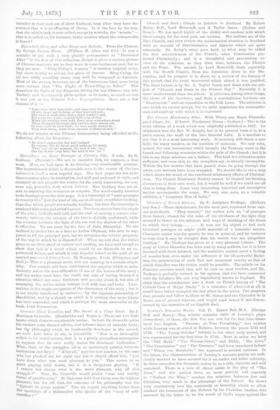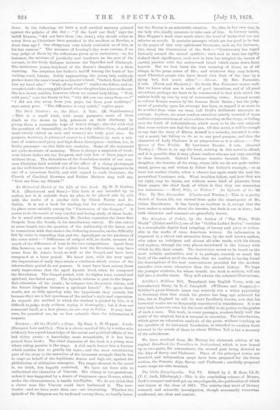Lcssing's Dramatic Works. Vol. II. Ernest Boll, M.A. (George Bell
and Sons.)—This volatile contains eight of Lessing's plays (comedies) ; of those, tho first five are now for the first time trans- lated into English. " Damon ; or, True Friendship," was written while Leasing was at school at "Vioissen, between the years 1741 and 174-6. "The Young Scholar" belongs to the same early period, and was represented for the first time in 1748, Next in order we have the "Old Maid," "The Woman-hater," and fifthly, "Time Jews." "Time Freethinker" and "Time Treasure" had been translated before' and "Minna von Barnhelm " has appeared in several versions. In the latter, the characteristics of Loseing's maturer genius are suffi- ciently marked to have secured for it an earlier and wider celebrity. In these comedies the dramatic action is, as a rule, vigorous and well sostained. There is a vein of clever satire in the play of "The Jews," and the author here, as more gravely and cogently in "Nathan the Wise," touches the relations between Jew and Christian, very much to the advantage of the former. Ho shows very conclusively bow the contumely or brutality which so often marked the treatment of the Hebrew by his Christian brother, was assumed by the latter to be the result of God's anger against the
Jews. In the following, we have a well merited sarcasm pointed against the pulpits of the day :—" If tho Lord our God," says the bailiff Krumm, "did not hate them [the Jews], why should twice as many Jews as Christians have perished in the accident at Breslau, a short time ego? Our Clergyman very wisely reminded us of this, in his last sermon," The manners of Lessing's day were curious, if we may judge of them by the reflections given us in caricature,—as, for instance, the mixture of jocularity and insolence on the part of the servant, in the lively dialogue between the Traveller and Christoph. The boistorons young-ladyhood of tho Baron's daughter is a little startling. She surprises her father's bailiff kissing the hand of her waiting-maid, Lisette. Softly approaching, the young lady suddenly pushes clown the man's head on to Lisette's hand. "Indeed, Herr Bailiff, kiss my hand also." "With all my heart I" replies the fellow, and at- tempts to take the young girl's hand, when she gives him a box on the ear. She is a merry maiden, however, whom we cannot help liking. "Well, wild puss," says the Baron to her, "why did you run away from me ?" "I did not run away from you, papa, but from your scoldings," says saucy puss. "The difference is very subtle," replies papa.



































 Previous page
Previous page